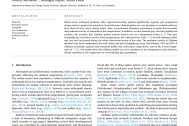Obsah
Winter-active arthropod predators (like vegetation-dwelling spiders) significantly suppress pest populations during winter in pome fruit orchards in Central Europe. Clubiona spiders are very abundant in orchards and have been observed to be active during winter. Here, we performed laboratory experiments to assess the movement and predation activity of clubionids at low temperatures. In addition, we also assessed prey survival (psyllids and crickets). We revealed that Clubiona spiders actively moved even at a temperature below 0 ◦ C. Pest prey (Cacopsylla sp.) was able to survive at low temperatures, but crickets died at 3 and -1 ◦ C. Overall Clubiona activity was very low but present during the whole observation period of five days. The predation activity of Clubiona declined with lower temperatures for both cricket and pest (Cacopsylla sp.) prey. Nevertheless, 44% and 25% of Clubiona individuals captured and consumed psyllid and cricket prey, respectively, even at the lowest temper ature of − 1 ◦ C. Our results show that Clubiona spiders are active predators at low temperatures and, therefore, should contribute to the suppression of overwintering pest populations.



